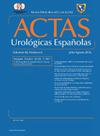Prevalencia de mutaciones en genes de reparación en hombres mexicanos con cáncer de próstata
IF 1.2
4区 医学
Q3 UROLOGY & NEPHROLOGY
引用次数: 0
Abstract
Introduction and objective
Mexico reported 26,742 new cases of prostate cancer in 2020. Different risk factors have been identified in the pathogenesis of prostate cancer. Among them, genetic factors and alterations or mutations in specific genes have been described in different ethnic groups worldwide. The aim of our study is to report the prevalence of germline DNA-repair gene mutations in Mexican patients with prostate cancer.
Material and method
We performed germline genetic testing in 50 patients with localized prostate cancer and 50 patients with metastatic prostate cancer. Demographic, clinical, and histopathological data were collected.
Results
Thirty-seven germline mutations were identified in 32 patients. The most commonly affected genes were ATM in 6%, followed by FANCA (5%), and ATR (4%). BRCA2 mutations were identified in 3%. The frequency of mutations was higher in the metastatic group.
Discussion and Conclusion
The results of our study show different mutations from those reported in different populations or regions. The use of PARP inhibitors is indicated in patients with germline mutations, specifically BRCA2, showing improvement in overall survival and progression free survival. To our knowledge, this is the first study reporting the prevalence of mutations in DNA-repair genes in Mexican patients with prostate cancer.
墨西哥男性前列腺癌患者中修复基因突变的发生率
导言和目标据报告,2020 年墨西哥新增前列腺癌病例 26 742 例。在前列腺癌的发病机制中发现了不同的风险因素。其中,遗传因素和特定基因的改变或突变已在全球不同种族群体中得到描述。我们的研究旨在报告墨西哥前列腺癌患者种系 DNA 修复基因突变的发生率。材料和方法我们对 50 名局部前列腺癌患者和 50 名转移性前列腺癌患者进行了种系基因检测。结果在 32 名患者中发现了 37 个基因突变。最常受影响的基因是ATM,占6%,其次是FANCA(5%)和ATR(4%)。BRCA2基因突变占3%。我们的研究结果显示了与不同人群或地区报告的基因突变不同的突变。PARP抑制剂适用于有基因突变(尤其是BRCA2)的患者,可改善总生存期和无进展生存期。据我们所知,这是第一项报告墨西哥前列腺癌患者 DNA 修复基因突变发生率的研究。
本文章由计算机程序翻译,如有差异,请以英文原文为准。
求助全文
约1分钟内获得全文
求助全文
来源期刊

Actas urologicas espanolas
UROLOGY & NEPHROLOGY-
CiteScore
1.90
自引率
0.00%
发文量
98
审稿时长
46 days
期刊介绍:
Actas Urológicas Españolas is an international journal dedicated to urological diseases and renal transplant. It has been the official publication of the Spanish Urology Association since 1974 and of the American Urology Confederation since 2008. Its articles cover all aspects related to urology.
Actas Urológicas Españolas, governed by the peer review system (double blinded), is published online in Spanish and English. Consequently, manuscripts may be sent in Spanish or English and bidirectional free cost translation will be provided.
 求助内容:
求助内容: 应助结果提醒方式:
应助结果提醒方式:


